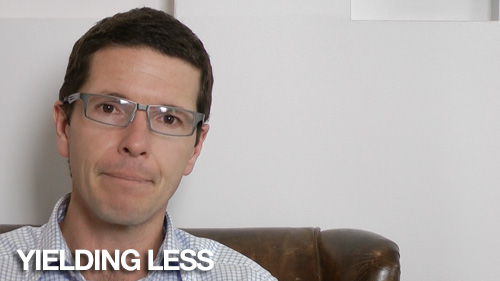Yielding less (12/11/2013)
Roger Montgomery is the Founder and Chairman of Montgomery Investment Management. Roger has over three decades of experience in funds management and related activities, including equities analysis, equity and derivatives strategy, trading and stockbroking. Prior to establishing Montgomery, Roger held positions at Ord Minnett Jardine Fleming, BT (Australia) Limited and Merrill Lynch.
This post was contributed by a representative of Montgomery Investment Management Pty Limited (AFSL No. 354564). The principal purpose of this post is to provide factual information and not provide financial product advice. Additionally, the information provided is not intended to provide any recommendation or opinion about any financial product. Any commentary and statements of opinion however may contain general advice only that is prepared without taking into account your personal objectives, financial circumstances or needs. Because of this, before acting on any of the information provided, you should always consider its appropriateness in light of your personal objectives, financial circumstances and needs and should consider seeking independent advice from a financial advisor if necessary before making any decisions. This post specifically excludes personal advice.


Daniel Falster
:
Hi Roger,
Thanks for the insight!
The only part of the valuation process described in Valuable that left me a bit confused was the way you handled different payout ratios. And here’s why. You argue that a business with high ROE is worth less if it pays a high divided, because the money would be better used to grow the company and generate even more profits into the future. But what if I as a shareholder, take my dividend and buy shares in another company with the same ROE. Wouldn’t I be getting the same return on my investment in the new company? Wouldn’t my investment compound in exactly the same way as if the money were reinvested into the original company?
Of course, this assumes that a similar ROE can be found elsewhere, which is probably true for most companies, but not for those with the highest ROE ( by definition).
I note that you did not include the formulas for adjustment of IV based on payout ratio in Value.able. That was about the only thing that was missing in an otherwise very valuable book.
All the best,
Daniel
Roger Montgomery
:
Your idea also assumes you will buy the shares in the new co at the equity per share…
Ben
:
G’day Rog,
The vast majority of the financial media were saying the same thing about Banks over the last 2 years. Remember the shock when Combank hit $50. Opportunity cost?
The banks are great quality, with great moats, improving profits, reasonable PE’s, and the theme is that most baby boomers own and intend to hold them for the next 30 years (given the actuaries are saying they will live to 100).
I agree with Switzer, a dip in banks will be largely seen as a buying opportunity. And Buffet is likely right in the long term, but for how long will the voting machine continue: 1 year or 30?
Roger Montgomery
:
Only time will tell Ben. In the long run intrinsic value determines price.
garry howlett
:
As mohamed-a–el-erian- of pimcos writes,
“Markets, too, have fallen into a state of relative complacency.
Comforted by the notion of a “central-bank put,” many investors have been willing to “look through” countries’ unbalanced economic policies, as well as the severe political polarization that now prevails in some of them. The result is financial risk-taking that exceeds what would be warranted strictly by underlying fundamentals – a phenomenon that has been turbocharged by the short-term nature of incentive structures and the lucrative market opportunities afforded until now by central banks’ assurance of generous liquidity conditions.”
Read more at http://www.project-syndicate.org/commentary/mohamed-a–el-erian-on-the-over-empowerment-of-advanced-countries–monet
Roger Montgomery
:
I think the change in sentiment is not that far away.